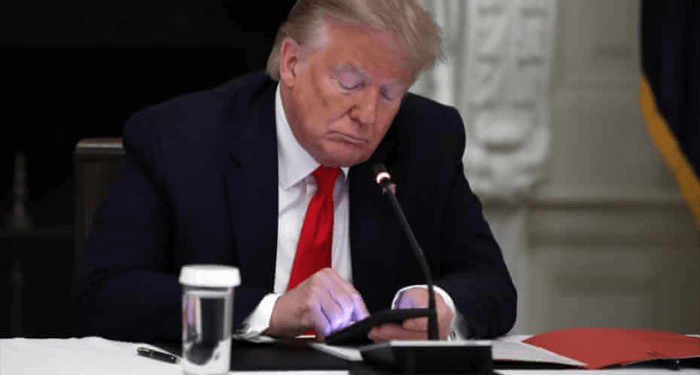U.S. President Donald Trump said on Wednesday he would temporarily lower new tariffs on many countries, even as he raised them further on imports from China, in a sudden reversal that sent U.S. stocks sharply higher.
Trump announced his latest pivot on his Truth Social platform hours after goods from nearly 90 nations became subject to stiffer, so-called reciprocal tariffs imposed by the United States.
The US president also said in a social media post that he was raising the tariffs imposed on imports from China to 125% “effective immediately” due to the “lack of respect that China has shown to the World’s Markets.”
Trump said “more than 75 Countries” contacted U.S. officials to negotiate after he unveiled his new tariffs last week.
His announcement came less than 24 hours after steep new tariffs kicked in on imports from dozens of trading partners.
The new trade barriers have hammered markets, raised the odds of recession and prompted retaliatory responses from China and the European Union.
Trump said he would raise the tariff on Chinese imports to 125% from the 104% level that took effect at midnight, further escalating a high-stakes confrontation between the world’s two largest economies.
Trump said he would at the same time suspend targeted tariffs on other countries for 90 days to allow time for U.S. officials to negotiate with countries that have sought to reduce them.
A 10% blanket duty on almost all U.S. imports will remain in place, the White House said.
The announcement also does not appear to affect duties on autos, steel and aluminum that are already in place.
U.S. stock indexes shot higher on the news, with the benchmark S&P 500 up more than 6%. Bond yields came off earlier highs and the dollar rebounded against safe-haven currencies.
Goldman Sachs cut its probability for a recession back to 45% after Trump’s move, down from 65%, saying the tariffs left in place were still likely to result in a 15% increase in the overall tariff rate.
Since Trump unveiled his tariffs late on Wednesday, S&P 500 companies have lost almost $6 trillion in stock market value, a record four-day decline for the benchmark going back to the 1950s
ALSO READ:Nigeria Is Collapsing, Speak Up, Peter Obi Charges Opposition
Since returning to the White House in January, Trump has repeatedly threatened an array of punitive measures on trading partners, only to revoke some of them at the last minute.
The on-again, off-again approach has baffled world leaders and spooked business executives, who say the uncertainty has made it difficult to forecast market conditions.
“Trump is gaining a reputation now for flip-flopping on tariffs and not having a consistent economic policy,” said Marcus Brookes of Quilter Investors.
U.S. Treasury Secretary Scott Bessent said the administration needed time to negotiate with more than 75 countries that had reached out and suggested Trump had used the tariffs to create “maximum negotiating leverage for himself.”
“This was his strategy all along,” he told reporters at the White House. “And you might even say that he goaded China into a bad position. They responded. They have shown themselves to the world to be the bad actor.”
Bessent is the point person in the country-by-country negotiations that could address foreign aid and military cooperation as well as economic matters.
Trump has spoken with leaders of Japan and South Korea, and a delegation from Vietnam was due to meet with U.S. officials on Wednesday.
Bessent declined to say how long negotiations might take.
Trump’s announcement appeared to surprise U.S. Trade Representative Jamieson Greer, who was testifying on Capitol Hill. “I understand it’s 90 days, I haven’t spoken to the president,” he told lawmakers.
“It looks like your boss just pulled the rug out from under you and paused the tariffs, the taxes on the American people. There’s no strategy,” Democratic U.S. Representative Steven Horsford said.














